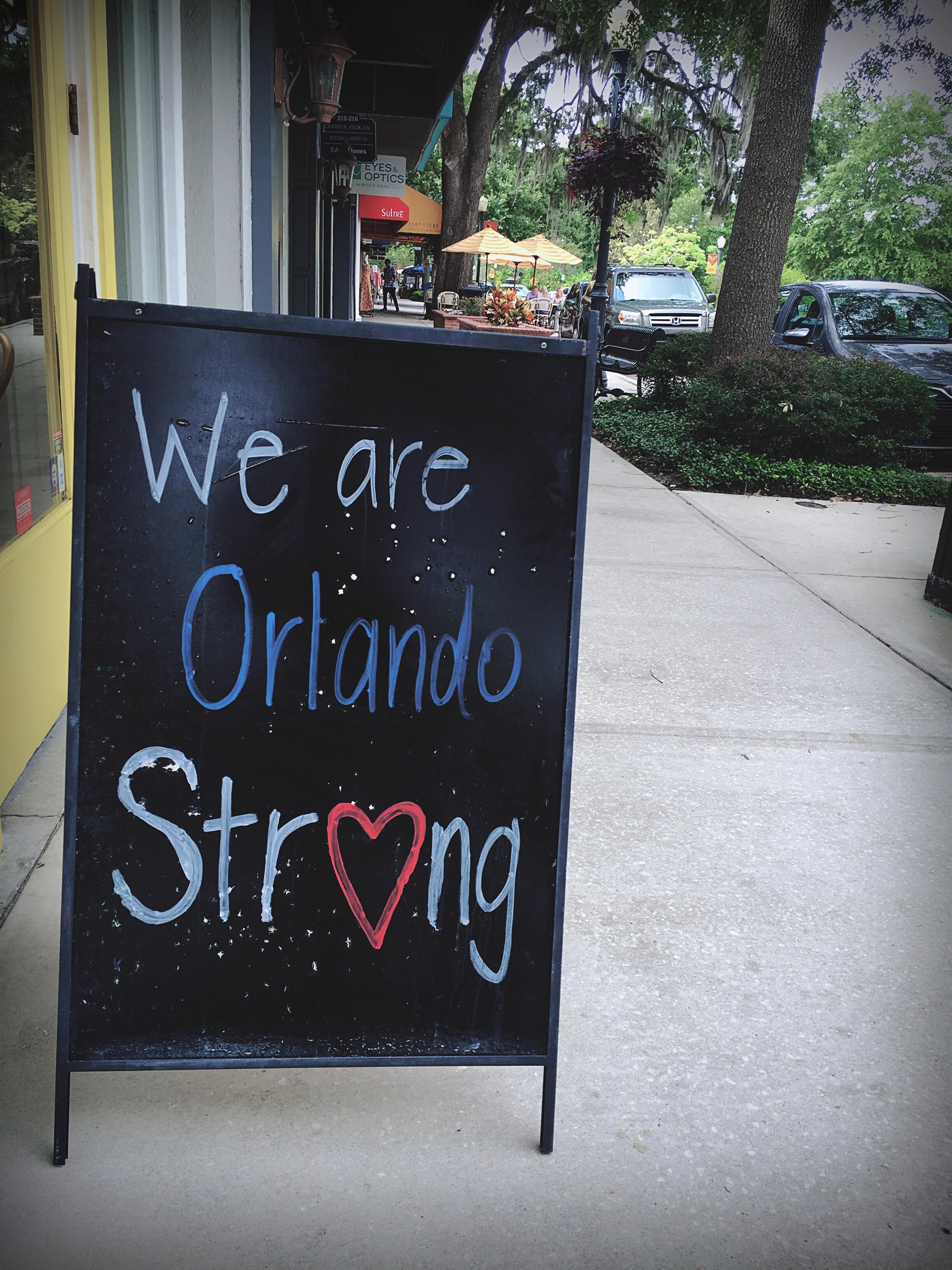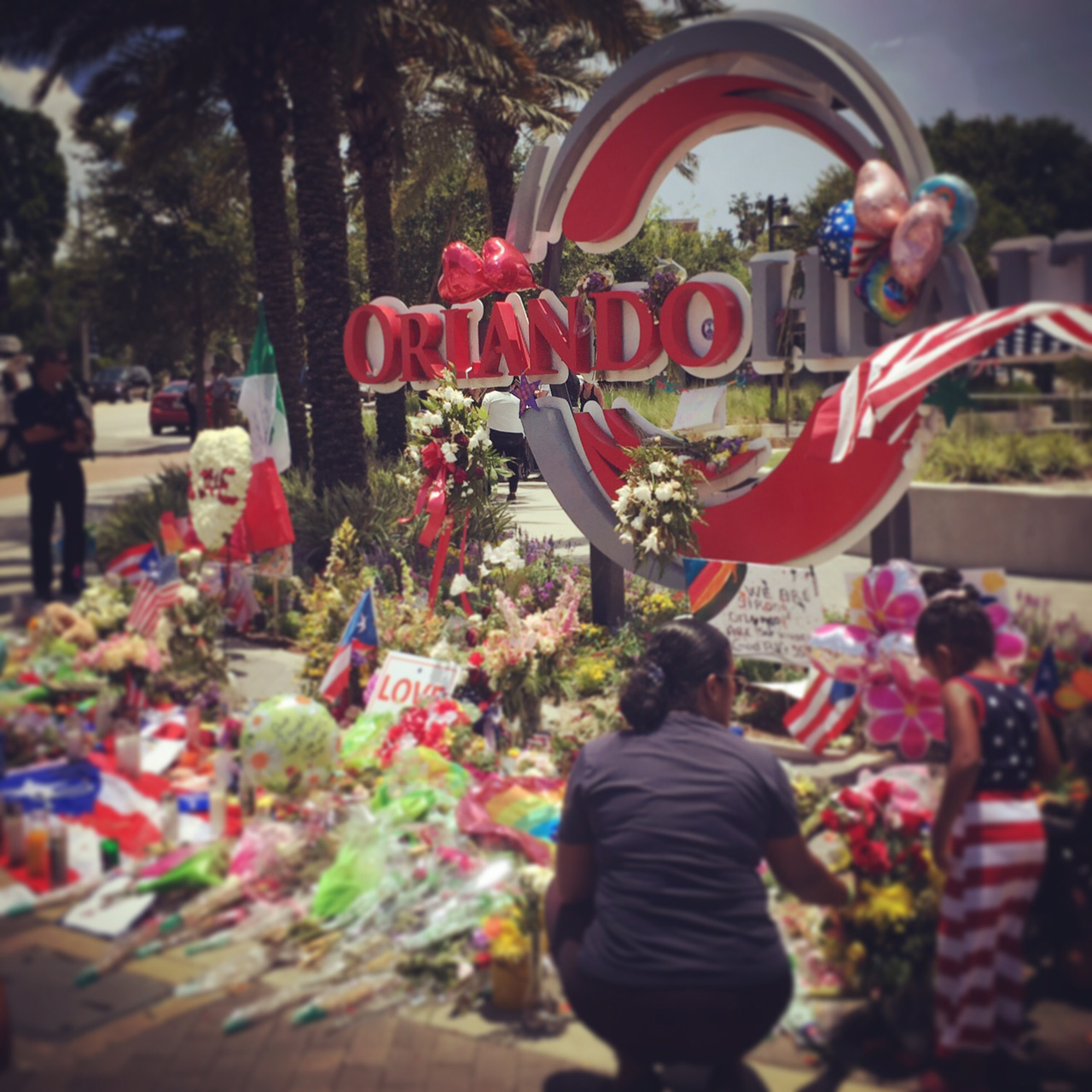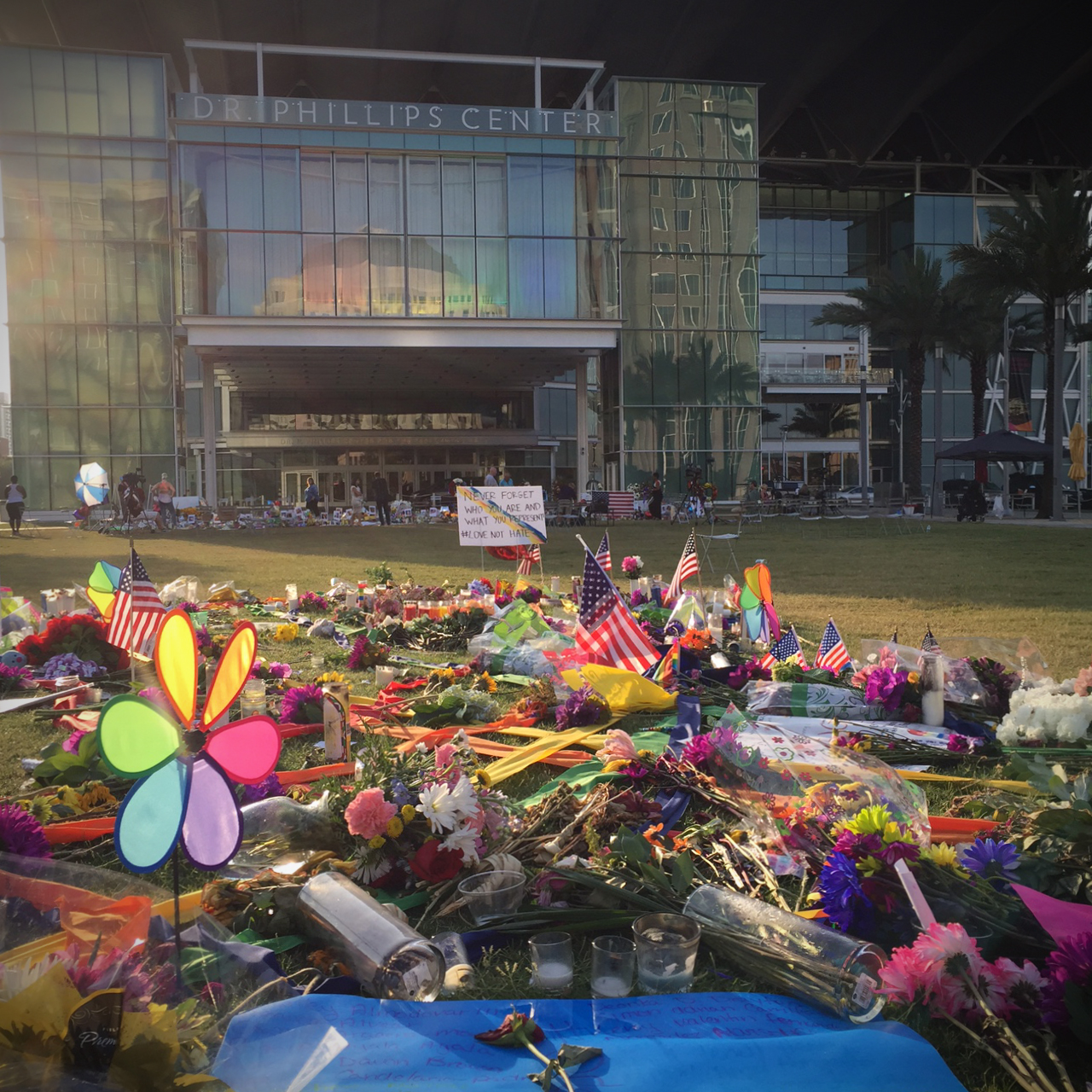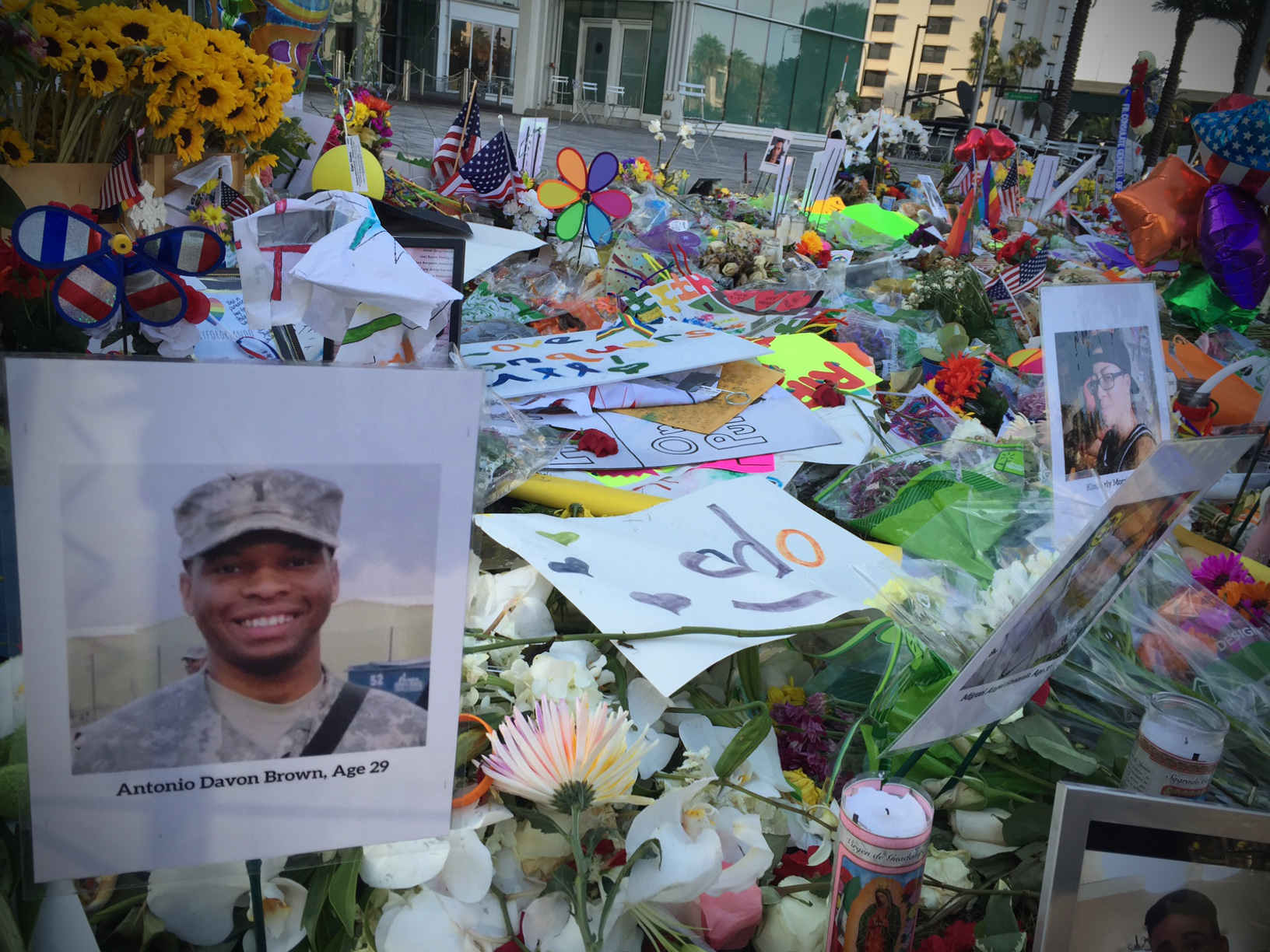
Tens of thousands attend a vigil for the Orlando shooting victims at Lake Eola, Sun., June 19. AP Photo/John Raoux
And the War Came: A Call for Unity—Not to Arms—in My Hometown Orlando
A Pentagon reporter raised in Orlando returned to measure the distance from the battlefield to the homefront, and found something unexpected.
ORLANDO, Fla. – The good news is it’s a long way from Fallujah to Orlando.
The bad news is it still feels like Orlando is a long way from the Middle East. If ever an American city was going to make the very real connection from the battlefields overseas to their own doorsteps, this could be it.
A confluence of threats, trends, and ideas has united this city, the still-grieving victim of a terrorist act by a self-professed Islamic extremist and the deadliest mass shooting in American history. But not in the way I’d expected.
Last week, I went home to Orlando. I grew up less than two miles from Pulse nightclub, which sits just blocks from my high school. Except back then, Pulse was Lorenzo’s, a tiny Italian restaurant with the world’s best garlic breadsticks, the place every family went all the time. My father grew up here as well, in old Florida, before things like Disney and air conditioning. Our neighborhoods, just outside downtown, are mostly midcentury homes along bumpy brick streets canopied with oak trees and baked in 95-degree heat.
I moved to DC two decades ago, and have since covered the Pentagon, the wars and turmoil across the Middle East, and the spread of Islam-appropriating terrorism.
On Sunday morning, when Orlando Mayor Buddy Dyer announced that 50 people, not 20, had died at Pulse, my heart collapsed in my chest and I began to cry.
The next day, I flew to Brussels, Belgium, with U.S. Defense Secretary Ash Carter. On the plane ride over, Carter offered condolences to Orlando and issued a call to remain committed to fighting ISIS. Over the next two days, NATO Secretary-General Jens Stoltenberg and other defense ministers made the same plea and pledge: to fight ISIS where they live, and their ideology where it spreads.
“Radical Islamist terror makes no distinction between shades of infidel,” said Israeli Prime Minister Benjamin Netanyahu. “This week it was gays in Orlando. A few days before that it was Jews in Tel Aviv. Before that it was music fans in Paris; travelers in Brussels; Yazidis in Iraq; community workers in San Bernardino; Christians and journalists in Syria. All of us are targets.”
Netanyahu’s was a well-balanced speech, especially for him, that offered empathy with a community struck by terrorism and stressed the need to keep fighting back.
But it didn’t feel that way down in O-town. After we landed back in Washington, I caught a morning flight to Orlando. I drove past my old Bel Air house and Boone High School to the corner of Orange Ave and Kaley, which I’m told they now call SoDo, within sight of Pulse. What I found over three days visiting friends and family, memorials and watering holes in Orlando’s heart, mostly between Winter Park, Thorton Park, Ivanhood, downtown, Delaney Park, and Conway, was a community reeling from the tragedy, but finding long-overdue unity in its shadow.

Photos by Kevin Baron
"It's like 9/11 around here," said Sandee Smith, mom of the family that has owned and run Orlando’s legendary Beefy King sandwich shop for 48 years. Everyone's being nice, she said. Drivers are letting other cars into the traffic lanes, or making room and waving you in when you need to back out. Smith is tired of the divisions, she said. “Why do we all have to be white, black, Muslim, gay,” she asks, instead of just human. “Shame it takes something like this to be human.” Her daughter, my high school classmate Shannon Woodrow, said it feels like everything has just slowed down. “There’s traffic, but nobody’s honking.” Traffic is a big deal in Orlando.
As the lunch rush died out, we looked across the street to the Plaza Live theater, where one week earlier, TV singing contestant Christina Grimmie had been shot and killed, reportedly by an obsessed fan from St. Petersburg. Under the marquee, flowers and balloons lined the curb . We remembered its earlier incarnation as the Rocking Horse movie theater, whose little rocking horse sign advertised the way the seats rocked. I saw Top Gun in that theater, and I think Goonies, too.
At the Beefy King drive-thru, banged-up Hondas mixed with gleaming Porsche Panameras as the locals came for their usual BBQ roast beef and tater tots. Inside, life seemed to be getting back to normal. Utility workers in reflective gear; a grandmother whose red t-shirt honored a deployed relative; several middle-aged children taking their elderly parents for lunch; the sounds of Florida’s unique Southern accent.

At another BBQ joint a block off Orlando’s iconic downtown Lake Eola, waiters and bartenders in Pulse t-shirts were still recovering from the gut-punch to their community. Perched at the pride-flag-lined corner of Summerlin and Washington streets, WildSide BBQ & Grille is a sister establishment to Pulse , both owned by Barbara Poma. All week, they had hosted victims, friends, and family, raising relief money with cheeseburger sales and becoming a gathering place for inner circles. On Thursday, they warmly welcomed a man who was accompanied by an emotional support service dog, one of several they said were given to shooting survivors.
“It’s inspiring. Despite everything that went on,” said bartender Nicole Paladino, 26, about the community coming together. She grew up here, too. “We’re pretty close with them.”
On and on, I heard the same. I heard a lot about coming together. The rainbow is for gay pride, but this week it came to mean community pride. Orlando pride. American pride. Some described to me a 21st-century Orlando that had become compartmentalized: old locals versus new residents; Latinos versus whites; gays, Christians, conservatives, liberals. Subsets of a whole in need of a unifying event, if not in this awful way.

Last Monday, thousands packed in front of City Hall for a midweek vigil. Barack Obama came to town Thursday, but the president’s visit was just a ripple in the preparations for the next fundraisers, vigils, and funerals. Saturday evening, the popular Orlando City soccer team asked fans to line the stadium in rainbow shirts. On Sunday, some 50,000 people encircled Lake Eola for perhaps a final vigil, and shook Police Chief John Mina’s hand, one by one by one.
I heard very little about fighting ISIS, a call to arms, joining up at the military recruitment station. Even though people knew Omar Mateen had claimed ties to ISIS, unlike after 9/11, it didn’t seem to matter as much. Not yet, at least. And maybe that’s ok.
It was another shooting. He was deranged. Just look at his childhood. Did you hear about his dad? What does it matter, anyway? It can happen anywhere. Or I can’t believe it happened here.
For years now, the leaders at the FBI, Department of Homeland Security, and domestic law enforcement have been asking Americans to say something if they see something. In this new era, they say, government forces cannot find every homicidal needle in a national haystack. They want Americans to be more aware, more vigilant, more involved in national-security decisions.
But there’s the policy talk that happens in the Washington bubble and then there’s real life across America. Carter, the defense secretary, likes to say in his speeches that it’s a good thing most Americans can sleep soundly at night while national security professionals do the work of keeping the nation safe. That’s not to say they sleep ignorantly, but soundly, as other Americans work to decipher, deploy, and die fighting to keep extremist fighters from coming here. People who work in Washington often talk about how refreshing—or frustrating—it can be to spend time back home in “real America” and not have to worry about the war, or ISIS, or the campaign, or Senate votes, or Pentagon policy, or the size of the National Security Council, or if the “pivot” is real, or what city will be the next Paris or the next Brussels.
Now we know. It is Orlando.
The distance from beheadings in Syria to the fading flowers, pinwheels, and homemade memorial signs on Orange Ave. seemed measured in universes. But security officials tracking terrorism certainly are connecting the dots from Raqqa to the Bataclan in Paris, the airport and subway in Brussels, and now Pulse nightclub in Orlando. I’m just not sure Orlandoans are making the same connection. Or if that’s a bad thing. One thing is certain, as a song goes: they have been changed for good.

There’s some talk of gun control. Some locals told me how much they hope for stronger restrictions, even as the Senate voted down a first round of gun-control measures. But another showed me his prized AR-15, while gay club-goers told TV interviewers that they’ll now carry personal firearms.
There was some talk of Islam. On Monday, local officials tried to mask Mateen’s references to ISIS in his 9-1-1 transcripts, sparking outcry from House Speaker Paul Ryan, R-Wisc., and others. The Justice Department overruled them and for now the political news conversation is about how much weight to give Mateen’s adopted Islamic extremism—and conservatives and liberals predictably arguing at each other over how the U.S. should react to those facts.
Others just couldn’t make sense of any of it.
The first familiar face to walk into Beefy King was my elementary schoolteacher, Mrs. Rita Musick, who refused a selfie because it had rained and she still doesn’t like to get her hair wet, you remember. “In my circle of friends,” she said, softly, we “can’t understand that kind of hate.” And after Friday’s murder across the street, she says, nodding toward the picture window, “It’s like the loss of innocence.”
In Orlando, a community tired of the divisiveness, I witnessed a passionate, unified, sustained cry for peace.
I heard little call for war.





